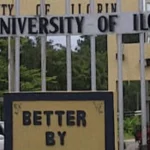THEE acting executive secretary of the National Universities Commission (NUC) Mr Christopher Maiyaki, has urged those hosting African Centre of Excellence (ACE-Impact) and Sustainable Procurement, Environmental and Social Standards Enhancement (SPESSE) projects, to work hard towards global recognition.
He particularly noted that the host universities must continue to work with internationally acclaimed accreditation bodies in order to achieve accreditation and favourable global ranking.
Maiyaki gave the charge during the third-joint National Project Performance Review Committee (NPPRC) meeting on the ACE- Impact and SPESSE projects, held at the NUC secretariat in Abuja,
He expressed satisfaction with the progress made on the implementation of the African Centre of Excellence (ACE-Impact) and Sustainable Procurement, Environmental and Social Standards Enhancement (SPESSE) projects by the various centres in Nigerian varsities .
The World Bank had, in 2013, approved sponsorship of 22 African Centres of Excellence (ACE) in some universities in West and Central Africa as part of initiatives to leapfrog Nigeria and other African countries from t development challenge.
Nigeria was awarded 10 out of the 22 centres in the first phase of the ACE project after a rigorous selection process and scholarly presentations from the participating universities.
Giving an account of SPESSE, Mr Maiyaki noted that despite the delay, the centres had been issued disbursement letters by the World Bank (WB), for results achieved and verified, after the first round of verification spanning January to June 2022.
He also disclosed that the report for the second round of the verification exercise covering two cycles-July to December 2022 and January to June 2023, was almost ready for submission to the Bank.
He particularly expressed excitement that the SPESSCEs had continued to graduate students from Tracks A (executive short courses) and B (advanced certificate courses) under the three components of the SPESSE, while admissions had commenced into Track C (Postgraduate diploma), D (Masters), and F (Bachelors) Programmes.
Maiyaki noted that while some centres had already commenced lectures for both tracks D and E, few others would commence lectures for the bachelors’ component next year.
He added that plans were underway in a significant number of the centres to commence PhD programmes, though these were not covered under the project.
He said that through this approach, the programme is expected to produce teachers for the sustainability of the project beyond its closure.
He also noted that this would ensure availability of a mass of professors in Procurement, Environmental Standards and Social Standards from the Centres of Excellence (CoEx).
The NUC boss said that a major concern on the SPESSE project during the last meeting was the delay in the deployment of the certification portal by the Implementing Agencies (Ias), Bureau of Public procurement (BPP), Federal Ministry of Women Affairs (FMWA) and the Federal Ministry of Environment (FMEnv).
He explained that currently, there had been further improvement with the procurement process for the portal reaching an advanced stage.
He said the progress and success story must be ascribed to the commitment of the World Bank’s SPESSE teams from the IAs as well as the procurement and IT consultants.
He disclosed that as the mid-term review for the SPESSE project inch closer, scheduled tentatively to hold from November 13-30, there would likely be conversations around project extension, with the level of significant progress recorded.
He stated that with ACE-Impact, the project had continued to stay above average with a Disbursement Link Indicator (DLI) achievement rate of 56 percent; disbursement rate of 42 percent and a 31 percent funds utilisation rate.
These figures, he said, were projected to improve as soon as relevant data were collected and results were also updated ahead of the 10th ACE-Impact Regional Workshop, scheduled to hold in October/November 2023.
The acting executive secretary emphasised that in a bid to secure global recognition for their academic programme, the host universities of the ACE- Impact centres must continue to work with internationally acclaimed accreditation bodies, such as the High Council for Evaluation of Research and Higher Education (HCERES) in France; the Royal Society of Biology (RSB) in the UK; the Agency for Quality Assurance through Accreditation of Study Programme (AQAS) in Germany; the Quality Assurance Agency for Higher Education (QAA) in the United Kingdom (UK) and the Agency for Public Health Education Accreditation (APHEA) in Belgium.
He stated that the engagements with these agencies have reached advanced stages, with some of the ACEs securing full international accreditation for their programmes.
He informed the centre leaders that as part of the current meeting, there was a schedule to review and clear the 2024 work and procurement plans for the six SPESSE Centres, the IAs and the NUC Project Implementation Unit (NUC-PIU) for onward submission to the WB.
Mr. Maiyaki expressed optimism that this time around, there would be no delay in securing a “No objection” from the World Bank. That way, he said, all would hit the ground running, once the New Year begins.
The Ag. ES said all the stakeholders must remain adaptable and ready to respond swiftly to the emerging trends and challenges and be conversant with the dynamic nature of the education landscape.
He expressed confidence in the capabilities of the various (ACE & SPESSE) teams and hoped that the insight and feedback from the review meeting would propel the project forward, aiming not just to meet only development objectives (PDOs) but surpass them.
The World Bank Project Coordinator, Dr. Joshua Atah, gave a status report of the achievements, challenges and the next step to be taken.






